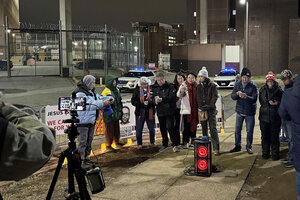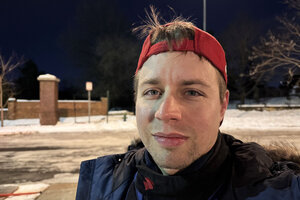Outside the DC jail, where Jan. 6 rage and devotion live on

Supporters of prisoners who took part in the Jan. 6, 2021, riot at the U.S. Capitol stand vigil outside the Central Detention Facility in Washington, Dec. 24, 2024. On this night, many participants were members of a Chinese Christian church in Virginia.
Linda Feldmann/The Christian Science Monitor
Washington
Brandon Fellows still insists he did nothing wrong on Jan. 6, 2021.
In his telling, he entered the U.S. Capitol “with permission from Capitol Police, and had a blast.” He acknowledges that he sat at a senator’s desk and smoked marijuana. But, he says, “Somebody just passed it to me, and heavily coerced me to take those two hits.”
“I hosted a really good party,” Mr. Fellows says of his Jan. 6 actions, adding, “Unfortunately, the FBI felt differently about it.”
Why We Wrote This
To critics, adulation for convicted rioters is anathema to a civilized society. But participants in the nightly Jan. 6 vigils see a miscarriage of justice that they hope will be righted when President-elect Donald Trump takes office.
According to the Justice Department, Mr. Fellows entered the Capitol building through a broken window, then “paraded” through a door holding a Trump 2020 flag. He was sentenced to 42 months – including five months for contempt over repeated outbursts during his trial – and was released from prison in May. Now, the former chimney repairman from Schenectady, New York, has become a regular presence at nightly vigils taking place outside the D.C. Central Detention Facility, where he was once held.
On a frigid January night, Mr. Fellows was one of 10 people gathered outside the jail to support those still inside – about 20 prisoners, they say – for their participation in the Capitol riot. Prisoners can look out the window and see the vigil, flashing the indoor lights to signal their appreciation. Every night, a few are able to call a participant’s cellphone, which is amplified to the crowd via loudspeaker.
It’s a tight-knit, eclectic group that includes Micki Witthoeft, the mother of Ashli Babbitt, a Jan. 6 rioter who was shot dead by a Capitol Police officer; a military veteran known as 1791 Storm Trooper, who livestreams the nightly vigil; a retired Army medic who also runs a livestream; and several congregants from a local Chinese Christian church, including a retired federal employee named Dwight Yen.
Ms. Witthoeft started the nightly vigils on Aug. 1, 2022, after she says her daughter spoke to her in a dream.
Nearly 900 days later, she and other participants remain united in their belief that the 2020 election was stolen and that U.S. government oppression continues. Just two miles from the Capitol, these nightly gatherings reflect the intense devotion to Donald Trump shown by his most ardent supporters, which helped fuel the former president’s successful bid in November to take back the White House.
To law enforcement officers injured in the Jan. 6 mayhem, as well as members of Congress and others present in the Capitol that day who feared for their lives, such adulation for convicted rioters is not only misguided but also anathema to a civilized society.
“If January 6th was a day of love,” as President-elect Trump has said, “then MAGA extremists nearly loved me to death,” said retired Capitol Police Sgt. Aquilino Gonell at a web event last week marking the fourth anniversary of the Jan. 6 attack.
Sergeant Gonell has spoken out and written a book about the abuse he endured that day, including being hit with a flagpole and beaten by his own baton. More than 140 police officers were injured in the riot, and one died the next day of “natural causes,” according to the D.C. medical examiner. Four others died by suicide in the days and months after the riot.
But vigil participants are counting the days until Jan. 20, when Mr. Trump becomes president again. He has promised to pardon most, if not all, of the so-called J6ers.
Incoming Vice President JD Vance said Sunday on Fox News that those who committed violence “obviously” should not be pardoned. But expectations are high. Nearly 1,600 people were charged federally in connection with the riot.
What if Mr. Trump doesn’t pardon everybody?
“There’s a good chance the vigils will continue,” says Sherri Hafner, the retired Army medic who livestreams the nightly gatherings.
Ms. Hafner says she wasn’t at the Capitol on Jan. 6, 2021, and doesn’t know anyone who was. She was protesting with a different “freedom movement,” she says, for 34 days on the National Mall to “address our grievances to the government.” Then she heard about the nightly vigils, right as they started, and joined up.
She says she heard that many of those held here were decorated combat veterans. “I took an oath never to leave a man behind. I consider these guys my brothers,” says Ms. Hafner, a combat veteran herself.
Ms. Hafner also participated in a commemorative Jan. 6 march around the fence surrounding the Capitol last week. She handed out flowers to be laid at the fence in honor of Ms. Babbitt. Counterprotesters shouted epithets as they walked by, but the opposing groups kept it nonviolent.
A leader of that march, Nicole Reffitt, is another organizer of the jailhouse vigils and the wife of J6er Guy Reffitt, a member of the antigovernment Three Percenter militia from Texas, who’s now incarcerated in Missouri, according to his wife. He carried a gun to the Capitol on Jan. 6, 2021, and was reported to the authorities by his son – a family drama that has been widely publicized. Mr. Reffitt did not enter the Capitol that day, but helped incite the crowd “into an unstoppable force,” a prosecutor said at his 2022 trial.
In an interview on Christmas Eve, when this reporter first visited the scene outside the D.C. jail, Ms. Reffitt paused as she sought to explain the message participants were trying to send by being out there, day after day.
“You know, really, I hope that it gives other people some courage. The J6 communities have gone through a lot. [It’s been] very polarizing,” Ms. Reffitt said. She hopes it “gives some community, some fellowship, encouragement.”
On that particular holiday eve, when about 20 people were gathered, the atmosphere was almost festive. A table was laden with food, a potluck organized by the Chinese church group.
The nightly rituals are structured in some ways like a religious service. The Pledge of Allegiance is recited. Prayers are offered. Over a sound system, the names of still-incarcerated J6ers are read aloud, and prisoners call vigil organizers from inside the D.C. jail to convey messages to their supporters. A recording of the chart-topping “Jan. 6 Prison Chorus” singing the National Anthem, with an overlay of Mr. Trump reciting the Pledge of Allegiance, is played.
Mr. Fellows, the former J6 prisoner, wasn’t there on Christmas Eve, but was happy to talk during the vigil on Jan. 8.
Is he expecting a pardon? Actually, he’d prefer a commutation, saying he wants to appeal his convictions. Looking ahead, Mr. Fellows is hoping to move to New Jersey and rebuild his chimney repair business. He says he’s thinking about joining a militia, both for the sense of community and for protection, in an increasingly unstable world.
“Being in a militia can be beneficial,” Mr. Fellows says, his red MAGA cap backward on his head. “You can join together, make a little neighborhood to protect yourselves, work on little projects together.”
“If it all crumbles – which some people say could happen...,” he continues, his voice trailing off. “Rome fell. Every empire’s fallen. We’ll eventually fall, too.”

